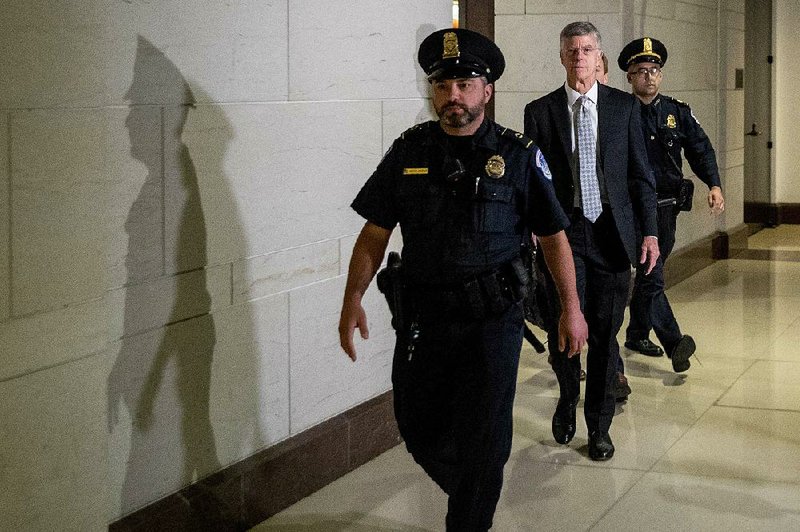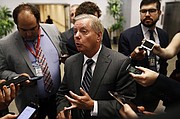WASHINGTON -- The senior U.S. diplomat in Ukraine told lawmakers Tuesday that President Donald Trump made the release of military aid contingent on public declarations from Ukraine that it would investigate Joe and Hunter Biden and the 2016 election, contradicting Trump's denial that he used the money as leverage for political gain.
The private testimony from acting Ambassador William Taylor undermined the repeated statements of the president and the depositions of other administration officials, with the potential to change the House impeachment inquiry of Trump.
Taylor, a seasoned diplomat, Army veteran and meticulous note taker, provided an expansive description of a series of events at the heart of the investigation. One Democrat described the testimony as "damning."
In a 15-page opening statement, obtained by The Washington Post, Taylor stood by his characterization that it was "crazy" to make the U.S. assistance contingent on investigations he found troubling.
[Video not showing up above? Click here to watch » https://www.youtube.com/watch?v=WeUFrl36fzY]
He described how officials from the Pentagon, State Department, CIA and former national security adviser John Bolton tried to get a meeting with Trump to discuss releasing the aid. He testified that Ukrainian officials were blindsided by the White House's decision to release a rough transcript of Trump's July 25 call with President Volodymyr Zelenskiy with "virtually no notice of the release, and they were livid."
Upon arriving in Ukraine last spring, Taylor became alarmed by secondary diplomatic channels involving U.S. officials that he called "weird," he said.
Taylor walked lawmakers through a series of conversations he had with other U.S. diplomats who were trying to obtain what one had called the "deliverable" of Ukrainian help investigating Trump's political rivals.
"In August and September of this year, I became increasingly concerned that our relationship with Ukraine was being fundamentally undermined by an irregular informal channel of U.S. policy-making and by the withholding of vital security assistance for domestic political reasons," Taylor said.
Taylor's testimony filled in some blanks about the activities of U.S. officials who appear to have sought Ukrainian help at the behest of Trump and his personal attorney, Rudy Giuliani.
At issue is whether the White House conditioned military aid and a meeting between the two presidents on Zelenskiy's cooperation, and whether that constitutes an abuse of Trump's office.
Taylor contradicted earlier testimony from Gordon Sondland, Trump's ambassador to the European Union, a key player in the effort to draw Ukraine into the election-related investigations.
Sondland told House investigators last week that he recalls "no discussions" with anyone at the State Department or White House about investigating former vice president and 2020 president candidate Joe Biden or his son, Hunter.
Taylor testified that Trump told Sondland in a Sept. 7 phone call that Zelenskiy must "go to a microphone and say he is opening investigations of Biden and 2016 election interference, and that President Zelenskiy should want to do this himself."
The contents of this conversation were given to Taylor by the White House official in charge of Europe, Tim Morrison, who after hearing that call notified Bolton and National Security Council lawyers, Taylor said.
House Democrats are expected to use Taylor's account of his conversations with Sondland to show that Trump had issued clear orders about what he wanted from Zelenskiy.
"During that phone call, Amb. Sondland told me that President Trump had told him that he wants President Zelenskiy to state publicly that Ukraine will investigate Burisma and alleged Ukrainian interference in the 2016 election," Taylor testified.
Hunter Biden had been a board member of Burisma, a large Ukrainian gas company.
"Amb. Sondland also told me that he now recognized that he had made a mistake by earlier telling the Ukrainian officials to whom he spoke that a White House meeting with President Zelenskiy was dependent on a public announcement of investigations -- in fact, Amb. Sondland said, 'everything' was dependent on such an announcement, including security assistance,'" Taylor told House investigators.
"He said that President Trump wanted President Zelenskiy 'in a public box' by making a public statement about ordering such investigations.'"
LAWMAKERS' REACTION
Lawmakers who emerged after nearly 10 hours of the private deposition were stunned at Taylor's account, which some Democrats said established a "direct line" to the quid pro quo at the center of the impeachment probe.
"It was shocking," said Rep. Karen Bass, D-Calif. "It was very clear that it was required -- if you want the assistance, you have to make a public statement."
She characterized it as "it's this for that."
Rep. Dina Titus, D-Nev., said, "You can see how damning this is."
Titus said "this certainly makes it pretty clear what was going on. And it was a quid pro quo."
"It was just the most damning testimony I've heard," Rep. Debbie Wasserman Schultz, D-Fla., said.
"He drew a very specific direct line from President Trump to the withholding of foreign aid and the refusal of a meeting," between Trump and the new Ukrainian leader, Wasserman Schultz said.
But the White House pushed back against the Democrats' assessment.
"President Trump has done nothing wrong," said White House press secretary Stephanie Grisham. "This is a coordinated smear campaign from far-left lawmakers and radical unelected bureaucrats waging war on the Constitution. There was no quid pro quo."
At the hearing, Taylor testified that he first learned about U.S. military aid being leveraged on a promise by Ukraine to investigate Trump's political foes in an early September phone call with Morrison. The top National Security Council official described how Sondland had told a Ukrainian official that "the security assistance money would not come until President Zelenskiy committed to pursue the Burisma investigation," Taylor testified.
Taylor told lawmaker he was "alarmed" by the news. "This was the first time I had heard that security assistance -- not just the White House meeting -- was conditioned on the investigations," he told lawmakers.
The same day he texted Sondland to ask if this was correct, a message that is now already public: "We [are] now saying that security assistance and [a] WH meeting are conditioned on investigations?" he wrote.
Sondland responded telling Taylor to call him instead of texting.
Taylor also told lawmakers that Sondland had explained that Trump is a "businessman" and that when a businessman is about to sign a check to someone he asks for what he is owed. Taylor scoffed at the notion that Ukraine "owed" anything to Trump.
After they hung up, Taylor sent Sondland a series of text messages laying out his concerns about holding up the military aide. That's when he wrote "I think it's crazy to withhold security assistance for help with a political campaign."
Sondland responded five hours later after he spoke with Trump, saying there was "no quid pro quo's of any kind."
Taylor, a retired former ambassador to Ukraine and a foreign-policy elder statesman, had exchanged text messages with two other diplomats in which he called the withholding of the security assistance and the reason for it a "nightmare scenario."
TWEET BACKLASH
Hours before Taylor arrived, Trump called the impeachment inquiry a "lynching," drawing swift condemnation from Democrats. Some accused the president of using race to attempt to distract from what Taylor may say.
In an early morning tweet, he added that the impeachment inquiry is "without due process or fairness or any legal rights," and he encouraged Republicans to remember this in the future.
The term lynching invokes the decadeslong racial history of white mob killings of black people beginning in the late 1800s through the late 1960s.
"You think this impeachment is a LYNCHING? What the hell is wrong with you," Rep. Bobby Rush, D-Ill., a former Black Panther leader, said in a Twitter post.
"I know the history of that word," Rep. James Clyburn, D-S.C., the House majority whip, said Tuesday on CNN. "That is a word that we ought to be very, very careful about."
Hogan Gidley, a White House spokesman who grew up in El Dorado, told reporters Tuesday that the president was not drawing a comparison between "what's happened to him" and one of the "darkest moments in American history." Gidley added that the president "has used many words" to describe news outlets that report unflattering details about him, and repeated Trump's position that he was not getting "due process."
The top Republican in the House, Rep. Kevin McCarthy of California, said of Trump's lynching comparison, "I don't agree with that language," adding, "It's pretty simple."
Senate Majority Leader Mitch McConnell also said he didn't agree with the language Trump used.
"Given the history of our country, I would not compare this to a lynching," McConnell, R-Ky., told reporters Tuesday. "That was an unfortunate choice of words."
Sen. Lindsey Graham, R-S.C., defended the word choice.
"This is a lynching in every sense," Graham told reporters Tuesday. "If Republicans were doing this, you'd be OK with it, calling it a political lynching because that's literally what it is."
Fighting back Tuesday night, Trump's re-election campaign tweeted out a 1998 video of then-Sen. Biden talking about President Bill Clinton's impending impeachment and saying, in part, "History is going to question whether or not this was just a partisan lynching."
Earlier in the day, Biden referred to Trump's lynching comparison as "abhorrent" and "despicable." Biden later tweeted that his own "lynching" reference 21 years ago "wasn't the right word to use and I'm sorry about that." But, he added: "Trump on the other hand chose his words deliberately today in his use of the word lynching and continues to stoke racial divides in this country daily."
Separately, in an interview that aired Monday night, Trump said he doesn't want copies of The New York Times or The Washington Post inside the White House.
He asserted that the media has treated the Biden family more favorably than his family. Then he suggested that the White House might cancel its subscriptions to newspapers he considers "corrupt."
"All these people for doing it from The New York Times, which is a fake newspaper -- we don't even want it in the White House anymore," he said during an interview with Fox News' Sean Hannity. "We're going to probably terminate that and The Washington Post. They're fake."
Trump specifically took issue with media coverage of Biden's son Hunter. After Hannity noted that Hunter Biden was hired for the board of a Ukrainian energy company despite his lack of experience, Trump said he has "a bad track record." The president pointed to Hunter Biden being "thrown out" of the Navy Reserve, which happened in 2014 after a drug test came back positive for cocaine.
"If that were Don Jr., if that were Eric Trump, who are very outstanding young men, it would be the biggest story of the century," Trump said.
Information for this article was contributed by Rachael Bade, Anne Gearan, Karoun Demirjian, John Wagner, John Hudson, Colby Itkowitz, Toluse Olorunnipa, Mike DeBonis, JM Rieger, Elise Viebeck and Brittany Shammas of The Washington Post; by Lisa Mascaro, Mary Clare Jalonick, Laurie Kellman, Lynn Berry, Matthew Lee, Alan Fram, Jill Colvin, Michael Balsamo, Darlene Superville, Jay Reeves and Bill Barrow of The Associated Press; and by Eileen Sullivan of The New York Times.
A Section on 10/23/2019


